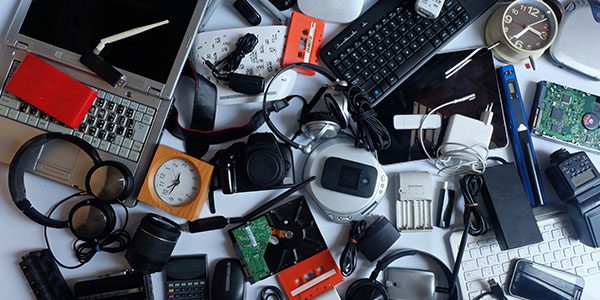Companion with R2 Certification Recyclers: Safeguard Information and Secure the Atmosphere
Companion with R2 Certification Recyclers: Safeguard Information and Secure the Atmosphere
Blog Article
Master the Requirements of R2 Accreditation to Make Sure Sustainable Service Practices
Making certain sustainable service practices has actually become a foundation of company responsibility in today's international landscape. At the leading edge of this movement is the R2 qualification, a strenuous standard that establishes the bar high for electronics recyclers and refurbishers. As businesses aim to straighten with eco conscious methods, understanding the demands of R2 certification is paramount. By adhering to these standards, firms not just bolster their environmental reputation yet likewise gain an one-upmanship in a progressively eco-conscious market. The roadmap to attaining R2 qualification is complex, entailing a deep understanding of key components, precise actions towards compliance, and a commitment to recurring upkeep. In a globe where sustainability is no more a mere buzzword yet an organization crucial, delving right into the details of R2 certification is a critical action that can lead the way for long-term success and positive ecological impact.
Significance of R2 Qualification
Achieving R2 Certification is critical for services aiming to demonstrate their commitment to sustainable and liable digital waste administration practices. This qualification, established by SERI (Sustainable Electronic Devices Recycling International), sets the requirement for liable reusing techniques in the electronics sector. By obtaining R2 Accreditation, businesses signal to their stakeholders that they follow stringent ecological, wellness, and safety policies while taking care of digital waste.
One of the essential reasons that R2 Accreditation is important is its focus on sustainability. With electronic waste being a considerable worldwide issue, businesses need to showcase their commitment to minimizing the environmental effect of their procedures. R2 Accreditation needs firms to execute processes that make certain the appropriate handling, repair, and recycling of electronic waste, therefore contributing to the round economic climate and lowering the buildup of e-waste in garbage dumps.
Moreover, R2 Certification boosts a business's track record and integrity. In today's eco conscious market, partners and consumers are significantly looking to work together with services that prioritize sustainability. By accomplishing R2 Accreditation, companies can differentiate themselves as leaders in liable e-waste administration, gaining an affordable side and bring in similar stakeholders.
Secret Parts of R2 Standards

Steps to Get R2 Qualification
To certify for R2 Qualification, businesses should thoroughly show conformity with a collection of strict standards and guidelines. The process of acquiring R2 Qualification includes several crucial steps.
Next, businesses require to evaluate their present practices and processes to determine any type of voids that require to be resolved to satisfy the R2 Standard. This may entail implementing new procedures, buying training programs, or making adjustments to existing operations. When any type of shortages are treated, companies can proceed to establish an extensive administration system that lines up with the R2 needs.
Complying with the application of the essential modifications, organizations have to go through a third-party audit to verify their conformity with the R2 Standard (r2 certification). This audit is performed by an approved certification body and consists of an extensive review of the company's centers, treatments, and documentation. Upon successful completion of the audit, services can receive their R2 Accreditation, demonstrating their dedication to liable and lasting organization practices
Advantages of R2 Conformity
Companies that adhere to R2 conformity standards can unlock a myriad of advantages in today's sustainable organization landscape. In addition, R2 conformity advertises ecological sustainability by making certain that electronic waste is handled in an environmentally pleasant fashion, decreasing the effect on land fills and all-natural resources. Generally, attaining R2 compliance not just assists services fulfill regulatory demands however additionally cultivates a culture of ecological duty and operational excellence.
Preserving R2 Qualification
Demonstrating see this site an ongoing dedication to accountable electronic waste administration methods, organizations need to focus on the precise procedure of preserving R2 qualification. Maintaining R2 accreditation entails normal audits, interior reviews, and constant renovation initiatives to ensure compliance with the rigorous needs stated by the Liable Recycling Practices (R2) criterion. Organizations should remain watchful in monitoring their electronic waste monitoring processes, information safety measures, and total ecological performance to support their R2 accreditation status.
Routine training and education and learning for workers are important to preserve R2 accreditation, as personnel need to be well-informed concerning the current best methods and market requirements. Maintaining in-depth records and documents of electronic waste recycling activities, downstream suppliers, and inner processes is vital for demonstrating conformity during audits.
Furthermore, organizations need to proactively involve with their supply chain partners and vendors to make certain that all entities involved in the digital waste management procedure comply with R2 requirements. By cultivating a culture of transparency, liability, and continuous renovation, services can efficiently preserve their R2 accreditation and support their dedication to lasting business practices.
Final Thought

Attaining R2 Certification is vital for companies intending to demonstrate their dedication to sustainable and accountable digital waste administration techniques. By acquiring R2 Accreditation, organizations signal to their stakeholders that they stick to rigid ecological, health, and safety and security guidelines while taking care of digital waste.
Upon successful conclusion of the audit, organizations can get their R2 Accreditation, demonstrating their commitment to responsible and lasting organization techniques.
Keeping R2 accreditation entails regular audits, interior testimonials, and constant improvement efforts to make certain compliance with the strict needs established forth by the Responsible Recycling Practices (R2) requirement. By recognizing the essential components of R2 criteria, taking the essential actions to get certification, and gaining the advantages of R2 compliance, businesses can demonstrate their commitment to accountable informative post digital waste administration.
Report this page